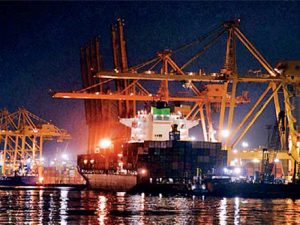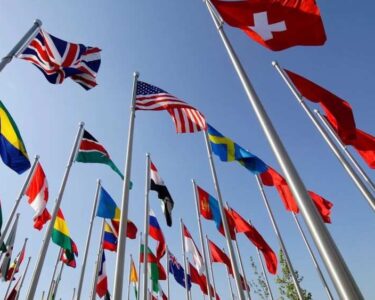The Port of Colombo, strategically positioned at the crossroads of major shipping routes, has long been a vital economic hub for Sri Lanka. However, recent developments, particularly the US investment in the Port’s Western Terminal, have placed the port at the center of Sri Lanka’s delicate geopolitical balancing act. As the country navigates the complex currents of international relations, it is crucial to examine the implications of this investment and its impact on Sri Lanka’s foreign policy trajectory.
The US investment, amounting to USD 553 million, comes as a welcome boost to Sri Lanka’s struggling economy. The development of a new deep-water shipping container terminal is expected to enhance the Port’s capacity and attract increased trade, potentially generating much-needed revenue for the nation. This investment also signals a growing US interest in the Indian Ocean region, where China has been expanding its influence through infrastructure projects and strategic partnerships.
While the investment holds promise for economic revitalization, it also raises concerns regarding Sri Lanka’s foreign policy alignment. The US, with its assertive global presence, seeks to counter China’s growing influence in the region. Sri Lanka, caught between these two powers, faces the challenge of maintaining a neutral stance while reaping the benefits of economic engagement with both.
Sri Lanka’s foreign policy has historically been guided by non-alignment, a policy that aimed to maintain neutrality amidst Cold War tensions. However, the evolving geopolitical landscape has blurred the lines between traditional alliances, making it increasingly difficult for smaller nations to remain truly non-aligned. Sri Lanka’s strategic location, coupled with its economic vulnerabilities, makes it a target for both major powers seeking to expand their influence.
The US investment in the Port of Colombo highlights the delicate balancing act Sri Lanka must perform. While the economic benefits of this investment are undeniable, it is important to consider the potential political implications. Sri Lanka must ensure that its foreign policy decisions are driven by national interests and not swayed by external pressures
Geopolitical currents:
To navigate these geopolitical currents effectively, Sri Lanka needs to adopt a multi-pronged approach. Firstly, it must strengthen its internal democratic institutions and uphold principles of good governance. A stable and transparent political environment will foster investor confidence and attract genuine partnerships. Secondly, Sri Lanka must engage in proactive diplomacy, actively participating in regional and international forums to voice its concerns and promote its interests. Thirdly, it must cultivate strong relationships with all major powers, seeking mutually beneficial partnerships while safeguarding its sovereignty.
In conclusion, the US investment in the Port of Colombo presents both opportunities and challenges for Sri Lanka. While it offers a much-needed economic lifeline, it also highlights the complexities of navigating geopolitical rivalries. Sri Lanka must tread carefully, prioritizing its national interests and pursuing a foreign policy that promotes peace, stability, and economic prosperity. By strengthening its democratic institutions, engaging in proactive diplomacy, and cultivating strong partnerships, Sri Lanka can chart a course through these turbulent waters, securing its place as a beacon of stability and progress in the Indian Ocean region.








